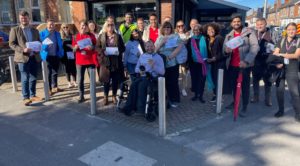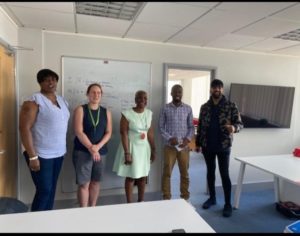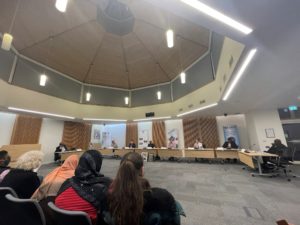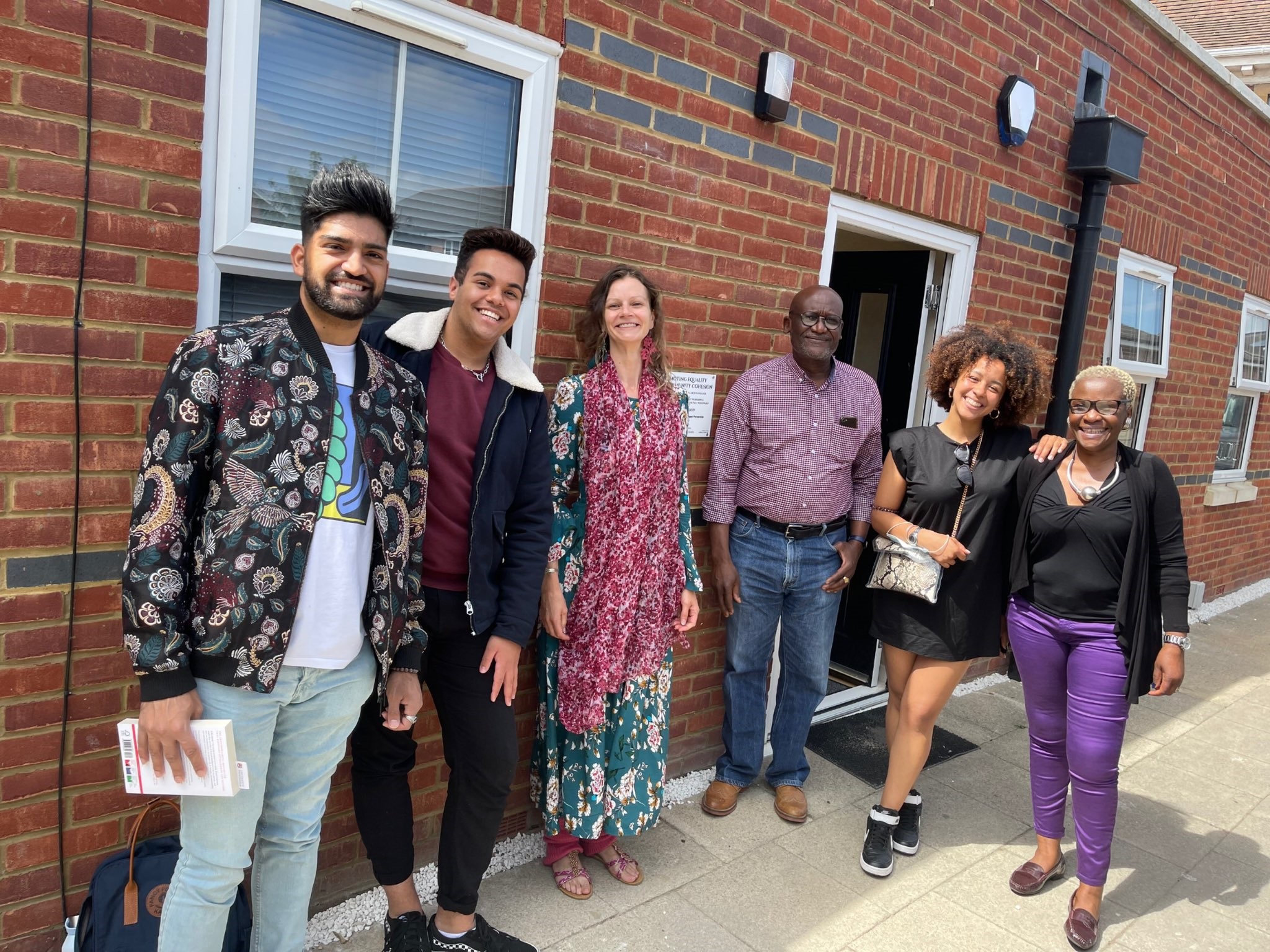We are pleased to publish our latest Think-Piece on the importance of community engagement with BAMER people within Higher Education, by Alice Mpofu-Coles, Martina Mabale De Burgos, Saif Maher and Sheldon Allen
In this blogpost, Alice Mpofu-Coles, Human Geography researcher, first discusses university community work and diversity in Reading. Martina Mable De Burgos, Saif Maher and Sheldon Allen discuss their experiences working in the community as University of Reading students.
Alice Mpofu-Coles, Human Geography Researcher
Universities have started to increase efforts to connect with diverse communities, and they are focused on tackling inequalities through equality, diversity and inclusion (E.D.I.) work. With Black Lives Matter 2020, there has never been a greater need to engage in race equality, address attainment gaps, decolonise the curriculum, and look at how to increase the representation of Black academics. The Higher Education Race Equality Charter (R.E.C.) provides a framework through which institutions work to identify and self-reflect on institutional and cultural barriers standing in the way of Black, Asian and Minority Ethnic staff and students.[1]
Most universities are based in towns and cities, and they should not stand in isolation from the majority of the local residents. They need to amplify the voices of the local population, not only in research but also as part of a broader impact on local people for societal outcomes. So why should community engagement, diversity and inclusion fit into Higher Education strategies and policies? It is crucial for the university as a civic institution to engage with communities through participation in diverse activities, partnerships, citizenship and learning from each other.[2]

Outreach event chatting to local residents and student with the local council, police, staff
We write on the premises of our experience of working as a community engagement team working together with local Reading BAMER groups. Reading has an estimated 162,666 residents, and approximately 35% are from BAMER communities. As a team, we met, participated in and engaged with over 50 community groups and organisations in the past six months. Part of the engagement occurred during the Covid-19 lockdown, and it was challenging to identify which organisation was running events.
Community engagement with BAMER groups needs a lot of groundwork to identify the key people to talk with, build trust, create relations, promote the university’s vision, and then engage. Most of the local BAMER people we have met have never engaged with the university, and they feel it is far off from their daily interactions. Historically, Reading is home to a generation of Windrush migrants. One woman (aged over 70) from this generation living in Reading said she felt ashamed of being a Black person living here, as her voice or societal outcomes have not been addressed, let alone those of her grandchildren. She further stated that they are labelled ‘a hard-to-reach community’, and when they come forward in research or speak, their voices are discarded or invalidated. The younger generation, who want to aspire for a better future from BAMER people, struggle to attain good grades at school due to socio-economic issues or other issues of belonging.
There is a need to increase more awareness at universities about refugees. Reading Refugee Support Group has supported the refugee community for over 25 years, and they have recently helped establish Sanctuary scholarships for students from sanctuary seeking backgrounds with the university. More so, environmental and climate change issues are not discussed enough with local BAMER community groups, people experiencing deprivation and exclusion in Reading in a language they understand. There are over 50 languages spoken in Reading. Dei (2006) explains, “inclusion is not bringing people into what already exists; it is making a new space, a better space for everyone”.
Now Saif and Martina will share their reflections on their roles as Student Community Champions working with local BAMER community groups to increase diversity and inclusion. Their role focuses on BAMER communities, disabled people, young people, those facing deprivation and exclusion. The work involves identifying barriers to community engagement for the university, building relationships and trust.
Saif Maher and Martina Mabale De Burgos, Student Community Champions
We engaged with local community groups like Alliance for Cohesion and Racial Equality (ACRE), Vocal Network, Utulivu Women’s Group, Mary Seacole Day Nursery, Apollo Youth Club and PHAB Partnership (MAPP), Reading Refugee Support Group and Joshua Academy. They clarified that educational support for young BAMER and socially deprived pupils is needed. Parallel to this support, life coaches and mentors are required too. One of the aspects of working with the community that we would highlight is a general will to work to improve young people’s lives in Reading. If children and young people from deprived backgrounds are not engaged, empowered, and supported to succeed and pursue their own goals, they will still face the same barriers later in higher education and the labour market.

Meeting with Joshua Academy discussing attainment gap in secondary schools in Reading
As local students, we have seen both sides of the University and Reading town community, better and worse. We grew up within a minoritised group and was on the side that does not know much of the university world. It has made our experiences of engaging with the local community much more fulfilling and effective; we understand many issues BAMER people face. They are the ones telling their children that going to university is their best prospect, but there is very little to support or help them with that ambition.
Working with Reading’s community has given us the opportunity to understand why a university can significantly impact its surroundings and why they are vital problem-solvers on broader global issues. It can give other students a wealth of knowledge too and experience. As an academic institution, it is impossible to work on climate change or sustainability, race equality, health and well-being, without cooperating with the community. Educational institutions are there not only to provide research and training but also to embed their culture and their values within their surroundings. Schools and universities can be the pillars of society. But they can’t work in isolation. This work of supporting and creating relationships with underrepresented groups has shown us there is a need to create a space at the university for communities. Community groups in Reading are willing to learn from the university, work with them and increase the capacity of students volunteering in local community groups and organisations to develop skills. It is a mutually nurturing relationship. It should not be “them” and “us”.
Community work or any work involving underrepresented groups is always perceived as something “voluntary” done for free because it often doesn’t bring the financial benefits to organisations those other projects do. It is ironic because, as student community champions, we are also coming from a part of those underrepresented groups and trying to achieve change from the university. We are not isolated from the community, and we face the same issues on and off-campus. The Race Equality Review has proved that working with underrepresented groups requires more than individual volunteers passionate about diversity, racial equalities, and inclusion. It does require the resources of a team of employees, time, and effort to build relations across the university and community.

Equalities Alliance Black History Month Conference, organised by the Alliance for Cohesion and Racial Equality in partnership with the University of Reading Students Community Action Partnership, held at Reading Borough Council, Reading, October 2021
The university has ample examples of students from Black and Asian backgrounds achieving good educational outcomes and success, but they are unseen by the Reading community. Our team worked with the local BAMER community through collaboration, visiting them in their spaces, attending meetings and just listening. Organisations then came to the Welcome Week and Freshers’ Fayre, with students signing up to volunteer in the community. We arranged the Black History Month conference in collaboration with ACRE in October 2021. We brought in speakers from the University and Local Council, police, refugee groups, and community groups to discuss race inequalities. Taking one group of people and letting them help/inspire another is one small act of good that can lead to a world of change for the wider society.
Concluding thoughts
The importance of the universities engaging with local people and BAMER communities brings a grassroots approach to community engagement and forging collaborations to become part of the fabric. There is a reciprocal benefit for local, national and global engagement within the university through community engagement and inclusion where people are valued. It supports students at the university to learn skills that are not taught in their lectures while at the same time engaging with the space around them. The local communities also forge relationships with the university to collaborate on issues that matter to them and their town or city. The residents’ lives are enhanced as they feel valued to be part of their local university, and there is a continued increase in learning from each other. Local young people who have aspirations can explore ways of being supported through their university with the student volunteering scheme.
Further information
Read more about the University of Reading’s Student Community Champions and Diversity and Inclusion Work here: https://www.reading.ac.uk/about/working-with-the-community
Contact: community@reading.ac.uk or Dr Sally Lloyd-Evans: s.lloyd-evans@reading.ac.uk
References
[1] See: https://www.advance-he.ac.uk/equality-charters/race-equality-charter. Member institutions develop initiatives and solutions for action and can apply for a Bronze or Silver REC award, depending on their level of progress.
[2] See for example: https://www.aau.org/wp-content/uploads/sites/9/2018/04/Auditing-and-Evaluating-University-Community-Engagement.pdf

